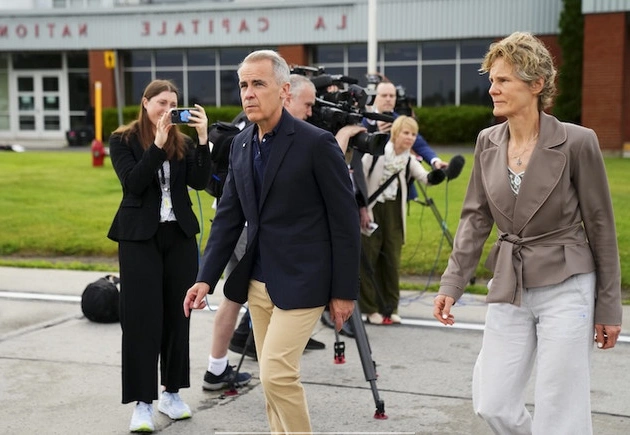
OTTAWA — Canadian Prime Minister Mark Carney is urging immediate negotiations to prevent a wider Middle East war following the overnight attack by American B-2 bombers on Iran.
Seeking Diplomatic Solutions
“Canada calls on parties to return immediately to the negotiating table and reach a diplomatic solution to end this crisis,” Carney said Sunday on X, shortly before boarding his Royal Canadian Air Force jetliner to Brussels for a European Union summit. “As G7 leaders agreed in Kananaskis, the resolution of the Iranian crisis should lead to a broader de-escalation of hostilities in the Middle East, including a ceasefire in Gaza.”
U.S. President Donald Trump’s deliberations about possible airstrikes on Iran surfaced at the G7 summit in Kananskis, Alberta last week when he departed a day early and warned on Truth Social that Iranian civilians should “immediately evacuate Tehran.”
Global Diplomatic Efforts
Foreign Affairs Minister Anita Anand issued a statement on X echoing Carney’s call for diplomacy. “Iran must not possess nuclear weapons as they are a threat to international security,” she wrote in the Sunday post. “We urge parties to return to the negotiating table and reach a resolution to this crisis.”
Trump also urged Tehran to make peace, warning that if it did not, Iran would face tragedy “far greater” than it has seen during the past eight days, as Israel and Iran exchanged rocket fire, with Iran firing dozens of missiles at Israel on Sunday.
While Trump triumphantly announced the attack from the White House on Saturday night, POLITICO’s White House staff reported the mood within his administration was less sanguine as the U.S. braced for a potential Iran counterattack. More than 40,000 U.S. troops and defense department civilians are stationed in the Middle East.
Security and Defense Partnerships
Anand urged Canadians traveling the region to register with Global Affairs Canada “to receive country-specific information, including available travel options.”
Anand and Defense Minister David McGuinty are accompanying Carney. In Brussels, they will sign the EU-Canada Security and Defence Partnership Agreement — described by one European official as “one of the more far-reaching of its kind the EU has ever signed with a third country.”
A Canadian government official who briefed reporters Saturday, granted anonymity to speak candidly on private discussions, added: “This high-level framework will help to boost transatlantic security and widen the scope of cooperation and dialogue between Canada and the EU.”
NATO Summit Discussions
Then it’s on to the NATO leaders’ summit in The Hague, where Trump’s decision to support Israel in attacking Iranian nuclear facilities is set to dominate the talks between the 32 NATO leaders.
The leaders will be discussing the timelines around raising NATO’s defense spending target to 5 percent of GDP from the current 2 percent. Carney announced earlier this month that Canada will meet the 2 percent target this fiscal year — 11 years after first committing to do so at a summit in Wales.
A central issue for the NATO leaders will be whether 2032 or 2035 will be the deadline for countries to reach the new 5 percent target. The decision will require unanimity among all 32 leaders.
“I won’t get into the details that are presently under negotiation,” said a Canadian official.
“There are quite a number of delegations that view a 10-year timeline as a more realistic goal to set for the alliance.”











